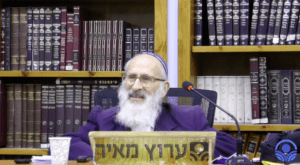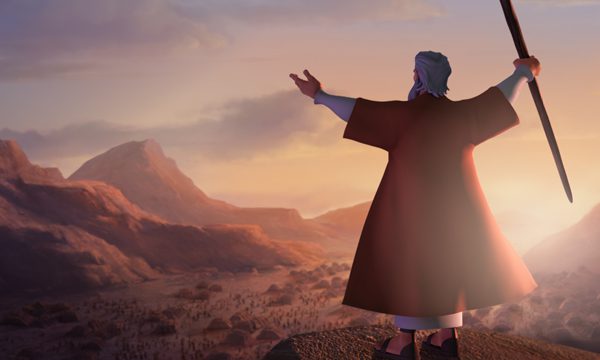SELECTED ESSAYS
by HaRav Shlomo Aviner, Rosh Yeshiva, Ateret Yerushalayim.

[From the book, “Moadim L’Simcha” Explorations Into the Jewish Holidays. Translated from the Hebrew by Bracha Sla.]
Commentary on the Haggadah – Ma’aseh BeRabbi Eliezer
It once happened that Rabbi Eliezer, Rabbi Joshua, Rabbi Elazar ben Azarya, Rabbi Akiva and Rabbi Tarfon were celebrating the seder together in Bnei Brak. They spent the whole night telling about the Exodus from Egypt. Finally, their students came and said to them, “Rabbis, it is time to say the Shema of the morning service.”
- Judah Leib Maimon (a leader of the Mizrachi movement fifty years ago) analyzed this passage of the Haggadah from a political-historical perspective. Bnei Brak was R. Akiva’s hometown; all the other sages lived elsewhere. R. Yehoshua, for example, lived in Peki’in, and R. Eliezer in Lod.¹¹ Why did these four great rabbis come to Bnei Brak to hold a seder, instead of being at home with their families?
- Maimon suggests that this seder in Bnei Brak was really a guise for a secret political and military conference. That is why they came to R. Akiva, who was both a venerated sage and a military expert. He was Bar Kochba’s right-hand man, so to speak,¹² and the spiritual force behind the Bar Kochba Revolt against the Roman Legions. Thus, the rabbinic leaders of his time took the exceptional step of coming to him for the seder in order to hold a strategic summit there.¹³ R. Akiva declared Bar Kochba to be the Mashiach and cited the verse, “A star (kochav) shall shoot out from Yaakov,” as a prediction of his leadership.¹⁴
With the unfolding of history, we know that Bar Kochba was proven not to be the Mashiach. So how do we understand a sage of R. Akiva’s caliber supporting him in this way? Wasn’t this a serious misjudgment? Heaven forbid! A giant such as R. Akiva does not err. Even at the time, no one dared publicly disagree with R. Akiva (except for one sage who told him, “Grass will grow out of your cheeks before the [Mashiach] Son of David comes!”¹⁵)
There were, however, some who had certain reservations. They felt that Bar Kochba did not fit the prophet Yeshayahu’s description of the Mashiach: “The spirit of God shall rest upon him, a spirit of wisdom and understanding, a spirit of counsel and courage, a spirit of knowledge and fear of God, and he shall find delight in the fear of God.”¹⁶ R. Akiva, however, did not let this deter him.¹⁷ He regarded Bar Kochba’s proud Jewish identity, his heroism and his courage – which enabled him to conquer the Romans, bringing salvation and independence to Eretz Yisrael for several years – as the deciding factors.¹⁸ Our Sages have never stated that R. Akiva erred in this. Even Rambam does not state that he made a mistake by encouraging Bar Kochba, but that “he and all the Sages of his generation [erred when they] imagined that he was the Mashiach.”¹⁹ R. Akiva interpreted Bar Kochba’s leadership and valor as Messianic, though it turned out to be false.²⁰
Shortly before HaRav Avraham Yitzchak Kook passed away wrote a letter to the newly founded Bnei Akiva Youth Movement, which took R. Akiva as its role model:
“As the Redemption blossoms, that special quality of R. Akiva is returning to Am Yisrael – that enthusiasm for, and devotion to, the vision of Redemption and rejuvenation of the nation and of Eretz Yisrael.²¹ It is coming back to life to guide us once again today. It is precisely because that vision originally failed, and Bar Kochba lost the war and Eretz Yisrael its independence, that we are confident that R. Akiva’s vision will one day come true. It was not for nothing that Am Yisrael has been fighting for its existence throughout all generations. We shall not fail the second time. Eventually we shall be victorious. That hour is fast approaching.”²²
The process of Redemption and renewal today is simply a modern version of the Bar Kochba Revolt. Our own revolution – the 1947 War of Independence – was, with God’s mercy, successful. The nation is reawakening, and this time we shall be redeemed, with the help of God.
Why the Pesach Sacrifice?
In the Haggadah, we read the following well-known passage: “R. Gamliel would say: Whoever has not made mention of these three things on Pesach has not fulfilled his obligation [to remember the Exodus]: Pesach, matza and maror.”²⁷ These three things, therefore, are the fundamentals of Pesach, and merely reciting them without understanding their essence is insufficient.
The Haggada continues by explaining the three things. The first one is Pesach:
What is the reason for this Pesach [sacrifice], which our forefathers ate when the Beit HaMikdash was standing? It is because God “passed over” (pasach) our forefathers’ houses in Egypt, as it is written: “And you shall declare – this is the Pesach sacrifice to God who passed over the houses of Bnei Yisrael in Egypt, when He smote the Egyptians but saved our houses.”²⁸
We thus conclude that the Pesach sacrifice commemorates the “passing over” in Egypt.
This miracle is difficult to understand. God’s passing over the houses seems to imply that He had originally intended to kill all Jewish firstborn children too! How could that be? Weren’t all the plagues intended to save the Jews? How could anyone imagine that Jews would be killed in the last plague?
After 200 years of life in Egypt, the Jews had sunk into “forty-nine gates of impurity (tuma),” until it was almost impossible to differentiate between Egyptians and Jews. According to the Kabbalists, had Bnei Yisrael remained in Egypt any longer, they would have sunk into the fiftieth gate, and it would no longer have been possible to redeem them.²⁹
This is exactly what Uzza, the angel of Egypt, protested in Heaven as the Red Sea was being split for the Jews while the Egyptians were drowning: “Both Egyptians and Jews are idol-worshipers…. Why do you discriminate by saving one nation and drowning the other?” Similarly, the prophet Yechezkel describes the grievous failure of Bnei Yisrael: “They rebelled against Me and did not agree to listen to Me; no man would cast off his idols, nor forsake the gods of Egypt. I thought to pour out My wrath upon them, to annihilate them in My anger in the land of Egypt.”³⁰
Thus, the miracle of passing over the Jewish houses teaches us a momentous lesson. God chose us not for our righteousness – as our deeds were also evil – but rather out of His love for us. In other words, He lovingly created a Jewish Nation with an eternal Jewish soul, which not even debased behavior can extinguish. Passing over the Jewish houses, distinguishing between the Jewish and Egyptian firstborns – identical as they may have seemed in both appearance and behavior – is the greatest miracle of all, and the source of all other miracles which God in His mercy has performed for us.
This is why R. Gamliel, in his God-inspired wisdom, declared that one who has not made mention of the Pesach sacrifice has not fulfilled his obligation, for he has not understood the basic idea of the Exodus from Egypt.
The Splitting of the Sea
It has been asked: Why was the Splitting of the Sea considered such a great miracle for Am Yisrael ? Wasn’t the very same miracle performed for just a single individual – R. Pinchas ben Yair? The story of R. Pinchas ben Yair’s miracle is related in the Talmud:
One time on his way to redeeming captives, R. Pinchas came to a treacherous river called Ginai. R. Pinchas commanded, “Ginai, split so that I may pass through!” The river responded, “You are following your Master’s commands and so am I. You, however, may not succeed, whereas I will always succeed in following His command.” R. Pinchas said, “If you don’t split, I will decree that no water flow here forever!” The river split.
Thus, the Talmud concludes, R. Pinchas ben Yair had the power of Moshe Rabbeinu and all myriads of Am Yisrael put together.³¹
- Zadok HaKohen of Lublin points out that the Splitting of the Sea is, in the same way, a sign of the worth of Am Yisrael. The fact that God performs miracles for righteous individuals proves that the miracles performed for Am Yisrael – for example, the Splitting of the Sea – are a measure of the greatness of our nation.³²
- Zadok goes on to say that what looks like an exceptional miracle, when performed for an ordinary person, can happen every day to a man who is completely righteous (tzaddik gamur). In the Talmud, we are told that R. Chanina ben Dosa saw nothing unusual in instructing God: “He who commanded oil to burn can command vinegar to burn as well.” He was poverty-stricken and had no oil to light the Shabbat candles; therefore, he used vinegar instead!³³
But biggest miracle of all is the revelation of the inner sanctity of Am Yisrael to all the nations of the world. Even though Bnei Yisrael were sunk in forty-nine gates of tuma, and, like the Egyptians, were idol worshipers, God nevertheless dwelt with them in the midst of all their uncleanliness and they, deep down, continued to cleave to God.
Our Sages tell us that, “A maidservant at the Red Sea had a greater vision than did the prophet Yechezkel ben Buzi [who saw the Heavens open].”³⁴ It was not the maidservant’s own individual greatness which allowed her to see such a vision, but rather the fact that at that time the nation as a whole was on a sufficiently high level.³⁵ The Talmud goes on to relate that the waters split on behalf of individuals on two other occasions: once for a Jew who had the responsibility of guarding the Pesach matza from becoming chametz, and once for the Arab merchant who accompanied him. The waters did not only split for the tzaddik, R. Pinchas ben Yair, who was engaged in the great mitzva of redeeming captives; they split also for a simple Jew occupied with his own personal mitzva. R. Zvi Yehuda Kook explained that this was possible since every member of Am Yisrael has a share in the sanctity of the nation. Even a gentile accompanying them deserves to have the waters split for him.³⁶
The Talmud continues with the story of R. Pinchas ben Yair’s donkey, which refused to eat the barley offered to him at a hostel on the road. The barley was sifted to remove stones and dirt, but still she refused to touch it. Then R. Pinchas asked the hostel owner if terumot and ma’asrot (tithes) had been taken from the food. As soon as it was tithed, the donkey began to eat. R. Pinchas exclaimed: This poor animal only wishes to fulfill her Master’s will, and you dare to feed her untithed barley! However, the Talmud asks, is there actually a requirement to tithe food which animals eat? In response, the commentary of Tosafot cites the Talmud Yerushalmi, which states that this donkey was being stricter than the letter of the law! R. Zvi Yehuda explains that we can see from this that anything connected to Am Yisrael – even if it is physical and material – falls within the realm of the miraculous because of the Divine sanctity of Am Yisrael. It is no coincidence that the animal mentioned here is a donkey. Chamor is Hebrew for donkey and chomer is the word for material matter, for things belonging in the physical realm.
The donkey, therefore, symbolizes the physical, material aspect of the world, which, when connected to sanctity, becomes elevated. Thus, the miracle of the Splitting of the Sea for Am Yisrael expresses the idea that Am Yisrael as an entity is holy, with an inherent yearning for closeness to God.






